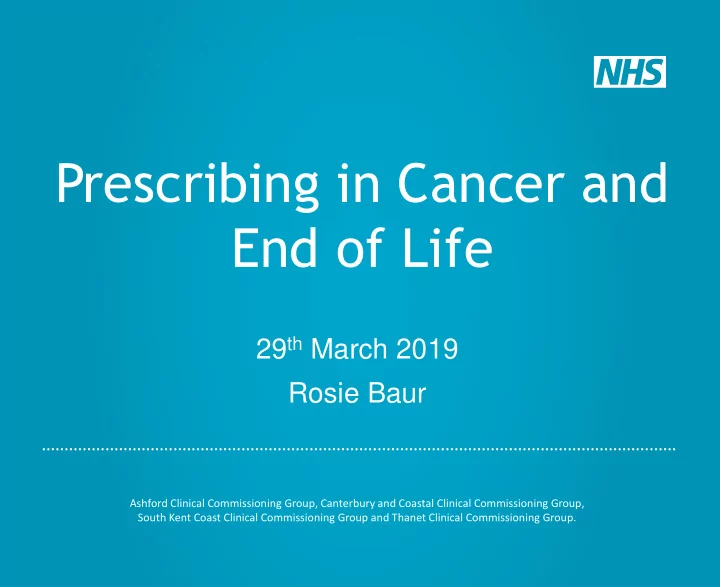

Prescribing in Cancer and End of Life 29 th March 2019 Rosie Baur Ashford Clinical Commissioning Group, Canterbury and Coastal Clinical Commissioning Group, South Kent Coast Clinical Commissioning Group and Thanet Clinical Commissioning Group.
Case Study 1 • A patient books into the GPs via the receptionist. The patient reports that they have had a cough for a number of weeks and it is not resolving. • The receptionist booked the patient into the Advanced Practitioner clinic • 2 courses of antibiotics in the last month • Symptoms not resolving
Case Study 1 - answers • Suspected lung cancer pathway? • Offer an urgent chest X-ray (to be performed within 2 weeks) to assess for lung cancer in people aged 40 and over if they have 2 or more of the following unexplained symptoms, or if they have ever smoked and have 1 or more of the following unexplained symptoms: • cough • fatigue • shortness of breath • chest pain • weight loss • appetite loss. [NICE 2015] • Safety netting patient – If not on pathway, who will follow this up?
Case Study 2 • Pt books into clinic via phone clinic • Feels “under the weather” • Not sure why • Had a temperature of 38oC • Shivering • Feels like they need antibiotics • Paracetamol taken 3 hours ago • History of breast cancer • Recent Chemo for breast cancer within the last 3 weeks
Case Study 2 – answers • Neutropenic sepsis guidelines • Door to needle • Recognise signs • Think outside the box • Risks of not sorting at time of appt • Would you prescribe? • UKONS triage tool – supports clinical judgement
UK Oncology Nursing Society (UKONS)
Case Study 3 • Persistent back pain • PMH Prostate cancer • Missed PSA check • Diagnosed over 2 years ago • Difficulty passing urine at times • Numerous appointments new analgesia's not resolving pain • reluctant to go back to hospital
Case Study 3 - answers • Analgesia- within scope of practice • Ensure spine is stable and refer to medical team • Rule out Metastatic spinal cord compression • Macmillan guide
Case Study 4 • Patient 75 years old, presenting PSA 22 (above 20 you order MRI, CT and MRI at first consultation or before with new urology co-ordinators) • MRI has shown PIRADS 5 (70+% chance of being high grade disease) throughout prostate involving seminal vesicles and 2 enlarged lymph nodes 12 and 14mm (above 10mm we would call as nodal positive), nodes also show on CT so stage is T3b N1 M0 • Biopsies have shown 13 of 14 cores gleason 4+5=9 up to 12mm core length. • On basis of staging not suitable for surgery, seen by nurse specialist who is unable to prescribe and has said that he needs to start hormones, be discussed in MDM and see oncology to discuss addition of Radiotherapy, referral has been made. • The letter requests that the GP practice commence Bicalutamide 50mg OD for 28 days before stopping altogether. • 2 weeks after starting the Bicalutamide the patient is then to start LHRH analogue of GP choice (Zoladex, Prostap, Decapeptyl or Lutrate) in a 1 month dose before switching to a 3 month dose if the monthly dose tolerated. • The patient is incredibly anxious to start hormones, he has been told he has a high grade prostate cancer with disease spread and the nurse explained that when he starts hormones the prostate cancer will start to come under control. • It is a Friday…
Answers Case Study 4 • There will not be any detriment to his care if he doesn’t start them that day. • Still no harm in waiting that long to start hormones. • Complex – who would prescribe? • Escalate • Safetynet
Cellulitis prescribing guidelines for lymphoedema or lymph node removal • Antibiotic of choice is Amoxicillin or Flucloxacillin for 14 days or longer • Start Clindamycin after 3 days if poor response • Erythromycin or Clarithromycin if allergic to Penicillin • If history of cellulitis- may be a prudent measure to keep emergency supply of antibiotics at home • May be useful to take ‘in case’ antibiotics abroad if travelling
End of Life • Just in case boxes • Anticipatory Care Plan • Prescription for community (only if in scope of practice)
Key Messages • Cancer is really specialist the message from this presentation is to only prescribe within your scope of practice • Specific messages from secondary to primary care about prescribing – don’t feel pressured to prescribe • Escalate • Could this be cancer? • Safety net! – make sure this patient is not left to manage on their own- when the patient needs to take action.. • Stay safe!
References • https://www.nice.org.uk/guidance/ng12/ch apter/1-recommendations-organised-by- site-of-cancer • https://www.nice.org.uk/guidance/cg151 • https://www.macmillan.org.uk/information- and-support/coping/side-effects-and- symptoms/other-side-effects/malignant- spinal-cord-compression.html • https://www.ukons.org/
Any Questions?
Recommend
More recommend